|
40 (15) High Street
Aylesford
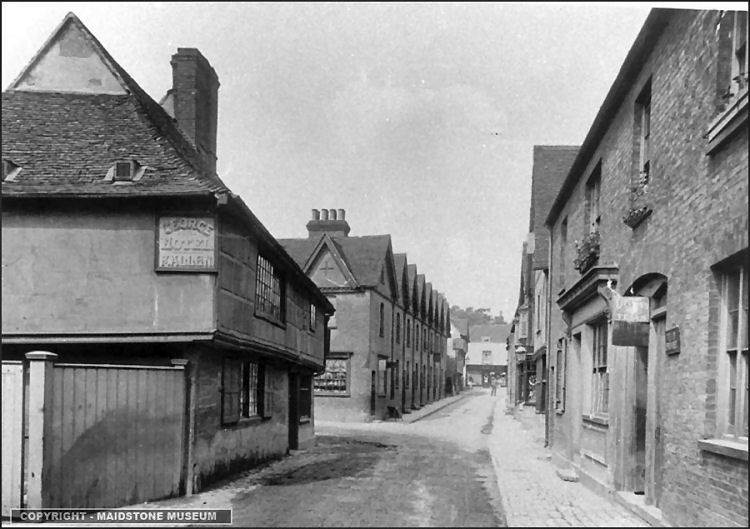
Above photo, 1904, by kind permission of Eric Hartland. |
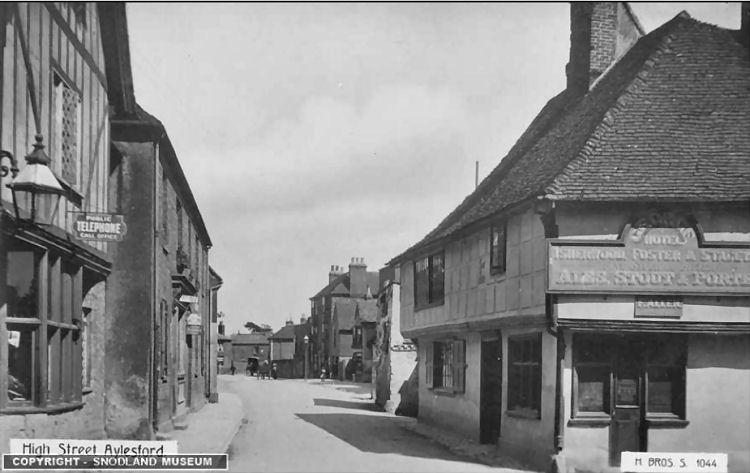
Above postcard, circa 1910. Kind permission from Eric Hartland. |
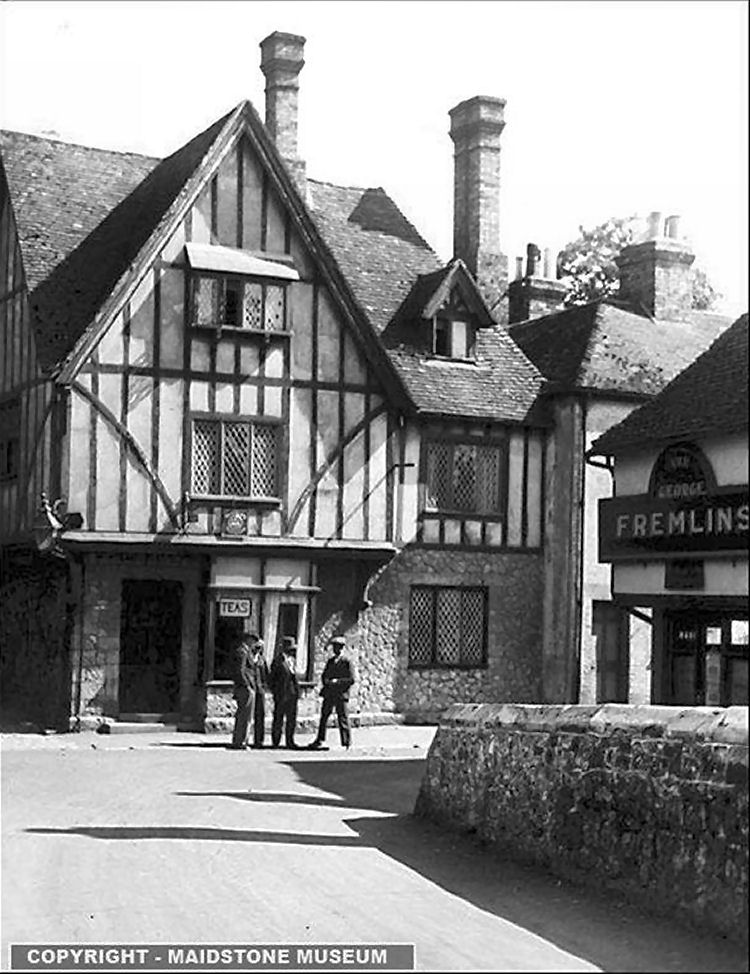
Above photo, date unknown. |
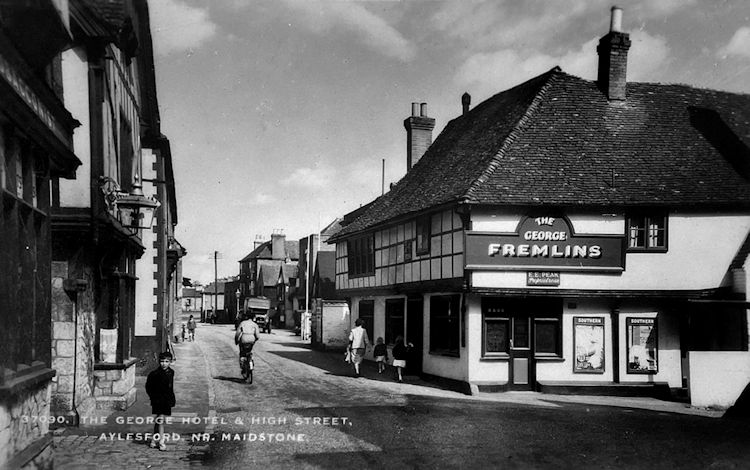
Above photo, circa 1947, kindly sent by Rory Kehoe. Like most of
Fremlin's pubs in the Maidstone are, the George had been an Isherwood,
Foster & Stacey tied house, until their Lower Brewery was taken over and
closed by Fremlin's in 1929. As per the sign, the licensee at the time
this photograph was taken, was Mrs Emily Elizabeth Peak. |
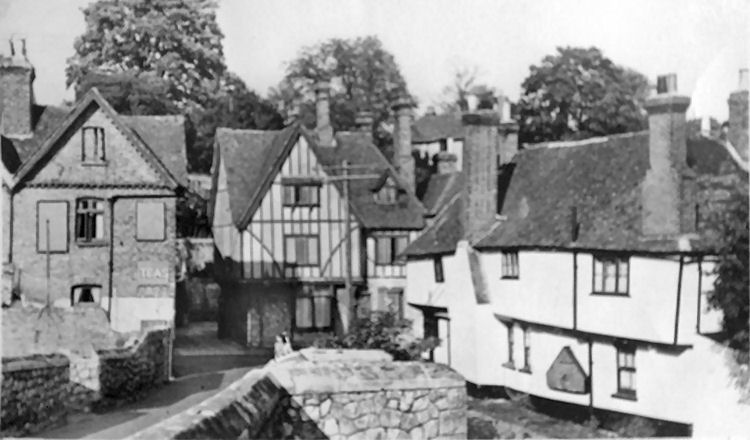
Above postcard, circa 1950, showing the pub as the white building on
the right. Kindly supplied by Rory Kehoe. |
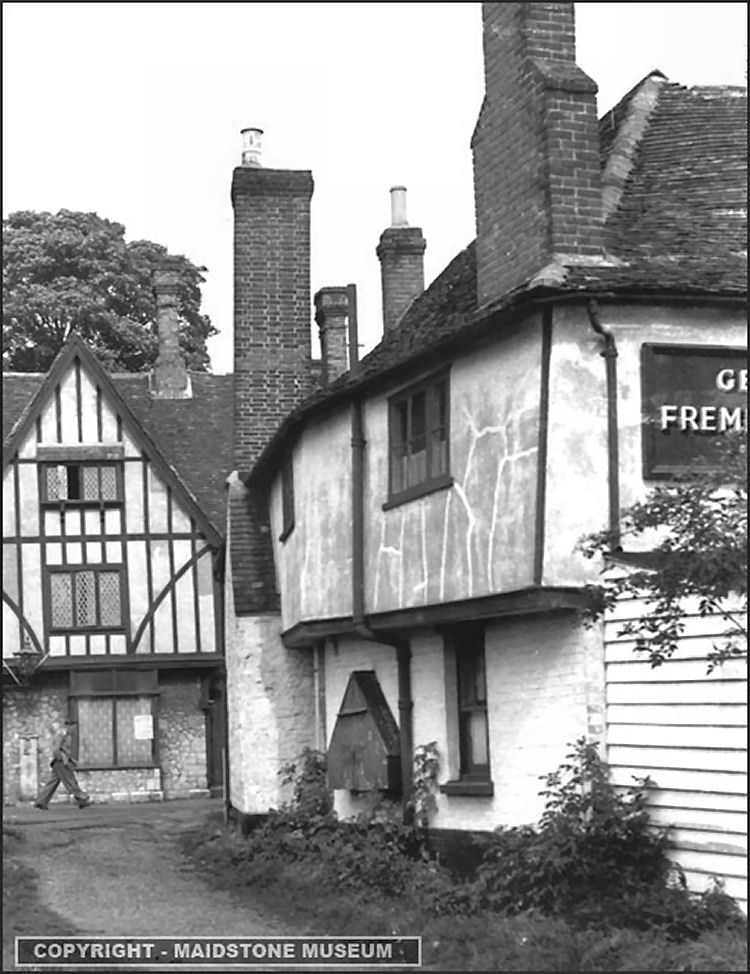
Above photo,
date unknown, by kind permission of Eric Hartland. |
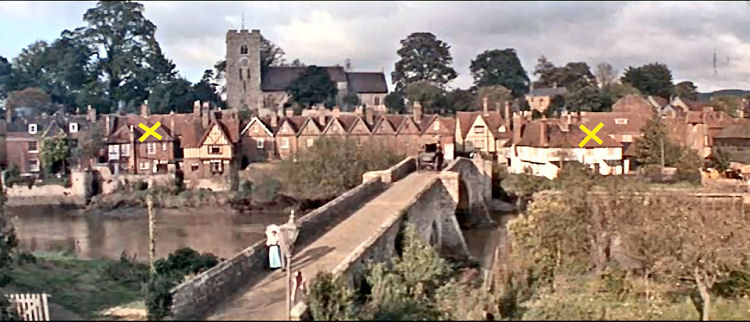
Above from the 1967 film "Half a Sixpence" showing the "George" (right)
and "Chequers" (left). |
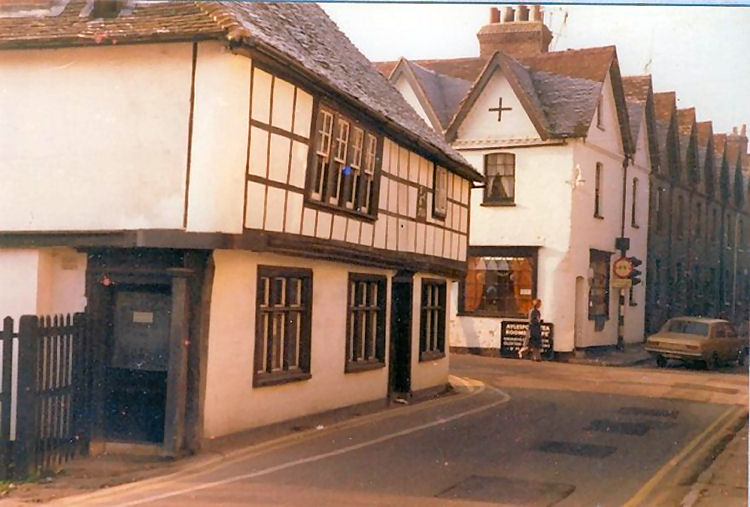
Above photo 1970s by Adrian Cabel
Creative Commons Licence. |
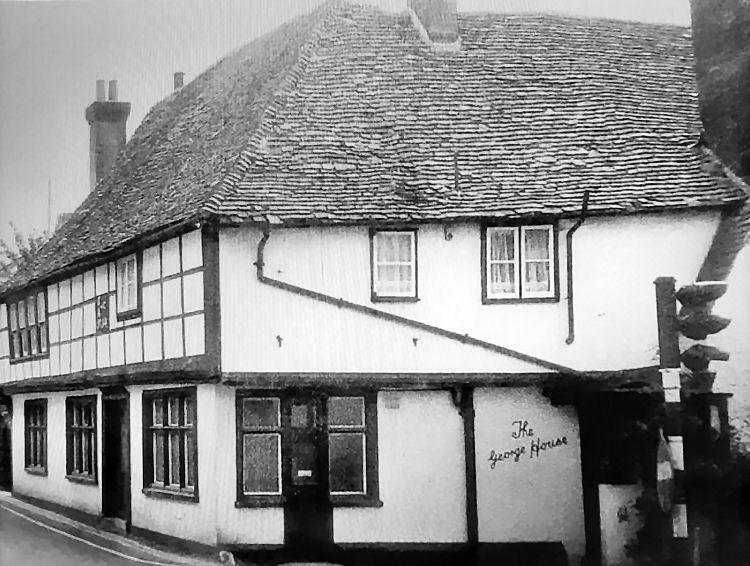
Above photo, 1979, kindly sent by Jeffrey East. |
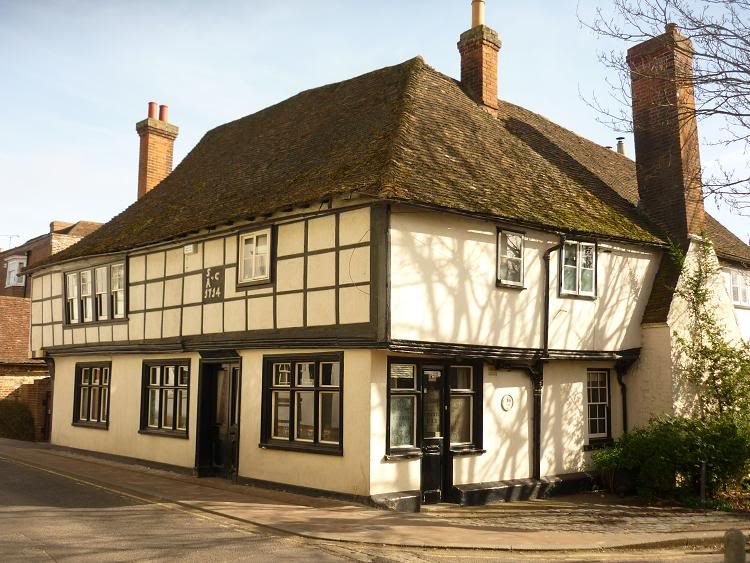
Above photo 2012. |
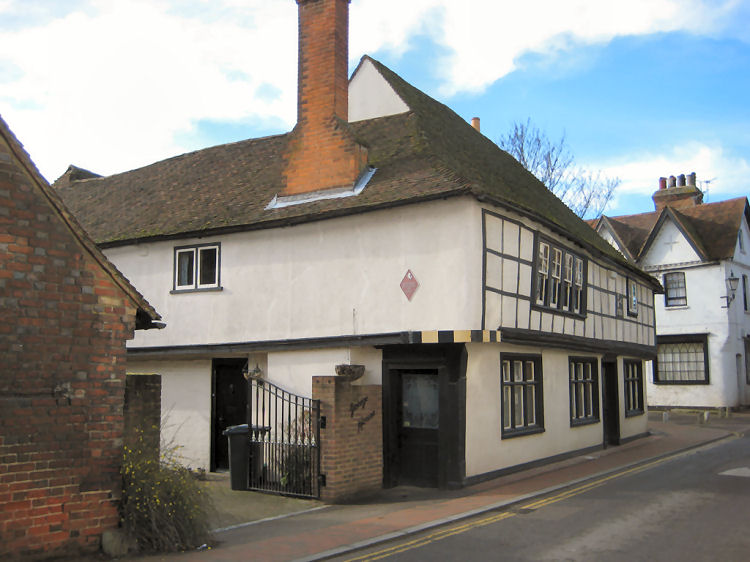
Above photo kindly sent by Eric Hart 2014. |
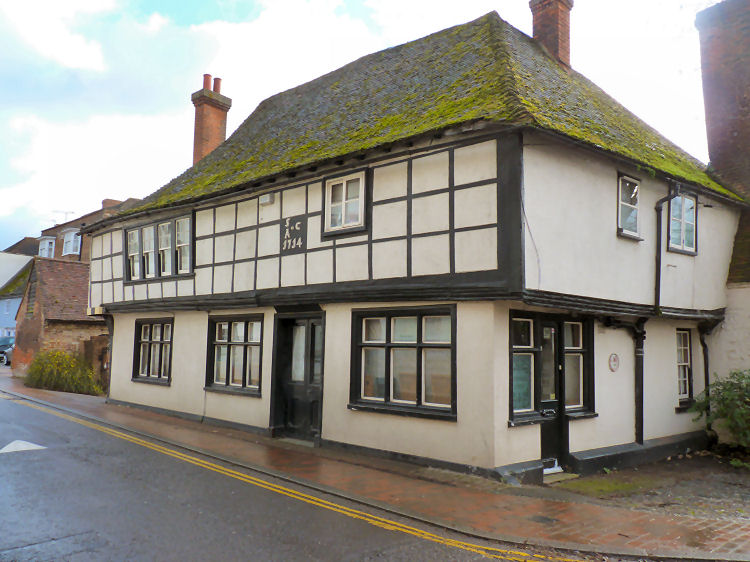
Above photo 17 January 2015, kindly sent by Tricia Francis. |
The site was originally known as the "Windmill and George" and can be
traced back to 1674, according to James H Sephton in his book "Images of
England Around Aylesford," and was used as a coaching inn.
After being restored in 1714 the "Windmill" part of the name was dropped.
Ralph Fremlin of Fremlin's Brewery bought the place in 1873 and they in turn
amalgamated with Whitbread Co. Ltd. in 1967 to become Whitbread Fremlins.
I believe it closed for business in 1977 and the premises is now a
residential house.
There is a little bit of confusion over the licensees of this and the "George
Inn." Hopefully this will be sorted one day.
|
Kentish Gazette, 7 May 1850.
AYLESFORD.
On Wednesday last the rent audit of the Earl of Aylesford was held at
the "George Inn," when his lordship with his accustomed liberality,
returned ten per cent., although the whole of his farms are let on
moderate rents, his lordship made the same allowance at the last audit.
|
|
Kent Times, 12 April 1862.
WEST MALLING. Petty Sessions.
Assemb/y Rooms, Monday. Before J. W. Stratford, Esq., in the
chair, the Hon. and Rev. Sir F. J. Stapleton, Admiral Randolph, Col
Fletcher. Capt. Cheere, J, Savage, S. L. Lucas, and M. H. Dalison,
Esqrs.
Several alehouse licenses were transferred, viz., the "George",
Aylesford, from Henry French to Charles How.
|
|
Maidstone Journal and Kentish Advertiser, Monday 21 August 1871.
Fatal Railway Accident.
On Saturday morning last, the gatekeeper at the Aylesford crossing,
George Bassett, aged 77 years, was run over by the 8.55 express train
from Maidstone, and his body cut to pieces.
At the inquest held at the "George Inn," in the afternoon of the same
day, before J. N. Dudley, Esq., it appeared that the first down train
was behind its time. This train was probably signalled by Bassett, and
he then prepared to cross over the down line with his white flag to
signal the up train which was then expected, but at this moment a
soldier, who had been speaking to Bassett, saw one of the railway gates
swinging across the up line of rails. Bassett also seemed to have
noticed this, and he attempted to cross over to fasten the gate, when
the train was upon him, cutting him literally to pieces; portions of his
body was picked up 50 yards from the spot. The accident, no doubt,
occurred in consequence of the deceased not having put the clasp over
the head of the gate, which would have prevented it being blown open by
the wind. The driver and guard were examined, and stated that they both
saw deceased, and attempted to wave him back, but it was too late, the
speed of the express at the crossing between 30 and 40 miles per hour.
Mr. Raggett the stationmaster at Maidstone, next explained to the jury
that the their line was worked on the block system, which does not allow
one train to leave a station before an answer has been obtained from the
station ahead that all is clear. The deceased had received the signal
from Maidstone and had answered back, his distant signal also was set
denoting line clear. It is usual for the driver of the express to shut
off steam immediately after passing the distance signal (about 600 yards
from the crossing), which he did on this occasion, but the speed and
weight of train was sufficient to carry the train to Aylesford station
without again putting on the steam.
The coroner briefly summed up, and the verdict was returned,
"Accidentally killed by a railway engine."
|
|
Maidstone and Kentish Journal, 20 April, 1889.
Serious Charge of Forgery.
Charles Stoneham, Miller, of Larkfield, was placed in the dock charged
with forgery.
Mr. Turner (from the office of Messrs. Scudamore and Brennan,
solicitors, Week Street) appeared to prosecute on behalf of Messr's
Wigan Mercer, and Co, bankers.
In stating the case he said he should have to ask for a remand, as he
was not in a position to produce all the evidence that day. He would be
able to prove in evidence that the prisoner had on several occasions
since December up until as recently as the present month forged the name
of Mr. Harry Ellis Epps, of "George Hotel," Aylesford. He had signed
Mr. Epps' name to cheques upon Messr's. Wigan, Mercer, and Co's. bank, and
obtaining money to the amount of £40. The charge was a serious one, and
was taken under the 23rd section of the Forgery Act, which if there
worships liked he would read.
The Mayor intimated that there was no necessity for that.
Mr. Turner, proceeding, said that Mr. Epps was a licensed victualler
living at Aylesford, and he banked with Messrs. Wigan, Mercer, and Co.
For some reason he had not looked at his bank book lately, and therefore
he had no means of knowing what had been debited to him at the bank.
Last week he received an intimation from the bank that is account was
overdrawn. Mr. Epps was surprised at this, for he was perfectly aware
that he had not drawn on his account to make it in that position. On the
receipt of that intimation Mr. Epps examined his bank book and found
that six cheques had been cashed at the bank and charged to his account
which were not his. The checks were made payable on order to Mr.
Stoneham, and every one was endorsed by him and was signed by the name
of H. E. Epps. Mr. Turner said he should give them evidence to show that
Mr. Stoneham signed those cheques so he should not that day be able to
prove the utterance, as the Prisoner was only apprehended yesterday
(Monday), but the police were making enquiries. The prisoner have been
in pecuniary difficulties and before he became bankrupt he had a small
account at Messrs. Wigan, Mercer, and Co's. bank, but he had not got an
account now. Mr. Turner then mentioned the new system that the bank had
adopted in checking the number of each cheque, and mentioned as another
fact that he should call Mr. Hoppe who gave the prisoner, by his
request, two blank cheques with two consecutive numbers and the numbers
be held corresponded with those cheques. A Mr. Patterson also handed him
(the prisoner) a blank cheque by his request. In conclusion Mr. Turner
said that he should show that Mr. Epps did keep an account at the bank,
and that the latter had been defrauded. Mr. Epps would say that he never
did draw those cheques, but they were signed by the prisoner and
endorsed by him.
Mr. R. Tadman, clerk at the Kentish Bank, proved that Mr. Epps banked
there. Messrs. Wigan, Mercer, and Co., had paid the cheques produced,
and charged them to Mr. Epps.
Mr. Epps said he was landlord of the "George Hotel," Aylesford. he
banked at Messrs. Wigan, Mercer and Co., but the cheques produced were
not his.
The Mayor:- How do you prove that?
They are not in my handwriting.
Further question by the Mayor, witness said that he had been in the
habit of giving the prisoner cheques. He knew the prisoners handwriting.
Mr Turner:- And to the best of your belief the cheques are signed by the
prisoner.
Witness. Yes.
Mr. Tadman, recalled, said, in reply to questions put by the Mayor, that
the payee's name was in the prisoners own writing.
Mr George Patterson proved that the cheque produced he handed to a young
man named Pearce for the prisoner.
At this stage of the proceedings, the prisoner was remanded till
Thursday Tuesday.
The prisoner applied for bail, but Mr. Turner opposed the application,
and it was refused.
The accused also applied that the pocketbook found upon him when
apprehended, might be handed over to his wife. This application was also
refuse, the Mayor remarking that they could not go from this ordinary
rule. Everything found in the possession of a prisoner was kept by the
police until the case was finished. Every opportunity would be allowed
for the prisoner to prove his innocence, if he was innocent.
Stoneham was then removed to the cells.
|
|
From the Probate Records, 1951.
PEAK Emily Elizabeth of "George
Hotel," Aylesford, Kent, widow, died 10 July 1951, probate London, 3
November to Dorothy Emily Upton, married woman. Effects £2,160 18s. |
LICENSEE LIST
JUPP William 1832-40

JUPP Elizabeth 1851
 (widow age 48 in 1851 (widow age 48 in 1851 ) )
FIELD Frances Mrs 1851+ (age 43 in 1851 ) )
FULLER Mr Mar/1854+

FRENCH Henry 1858-Apr/62+

HOW Charles Apr/1862+
FIELD William 2/June/1873-84 (age 26 in 1861 ) )
EPPS Harry Ellis
1884-99
 (age 31 in 1891
(age 31 in 1891 ) )

ALLEN Frederick 1899-1903+

TAYLOR Edwin 14/June/1910+
BUGGS William 1910-22
LONGHURST Albert 1922-30+
PEAK William 1932+
PEAK Emily Elizabeth 1939-10/July/1951 (dec'd age 76)
https://pubwiki.co.uk/GeorgeAylesford.shtml
http://www.closedpubs.co.uk/george.html
 From the Pigot's Directory 1832-33-34 From the Pigot's Directory 1832-33-34
 Census Census
 Maidstone
and Kentish Journal Maidstone
and Kentish Journal
 From Melville's Directory 1858 From Melville's Directory 1858
 From the Kelly's Directory 1903 From the Kelly's Directory 1903
|











